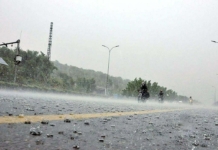Asian Development Bank’s (ADB) Director General for Central and West Asia Yevgeniy Zhukov has said that the organization’s next Country Partnership Strategy (CPS) for Pakistan, which is now under development, is anticipated to provide the groundwork for a larger climate portfolio in the following five years.
During a press conference on ADB’s 56th Annual Meeting in Incheon, South Korea, he discussed the CPS, the lending agency’s main tool for planning operations to achieve development achievements at the national level.
He also said that Pakistan was at the top of the list of nations where project finance will be the greatest in 2023, a statement of the ADB said.
Transport, energy, urban development, climate resilience, disaster preparedness, and food security were listed by Zhukov as key areas for financing. According to him, “Projects are in the pipeline and will be completed soon, after which total financing will be estimated.”
ADB officials said that work was underway on a regional climate change strategy and action plan for central and West Asia, and that the region’s climate funding will mostly go towards energy, agricultural, and transportation projects.
He continued by saying that the ADB has increased its goal of providing at least $100 billion in climate finance to Asia and the Pacific for the years 2019 through 2030.
The statement also made reference to a research that the ADB published today.
According to the ADB statement, the study, titled “Supporting Regional Actions to Address Climate Change,” warned that a lack of water would make Pakistan more dependent on foreign food supplies and put a large number of people at risk of food insecurity by increasing the risk of desertification and decreasing agricultural productivity.
The Central Asia Regional Economic Cooperation (CAREC) area, which comprises Central Asia, Mongolia, Pakistan, China, and South Caucasus, is predicted to be severely impacted by climate change, the report said.
According to the report, Pakistan, Georgia, and China are the only three nations in the CAREC area that have an ocean shoreline, putting them at danger from anticipated sea level rise.
The biggest issues Pakistan is dealing with in connection to the effects of climate change include heatwaves, melting glaciers, water shortages, and both droughts and floods.
Increased desertification, increased water shortages, and more extreme weather events like floods and droughts are all anticipated to result from higher-than-average temperature increases, the report continues.







